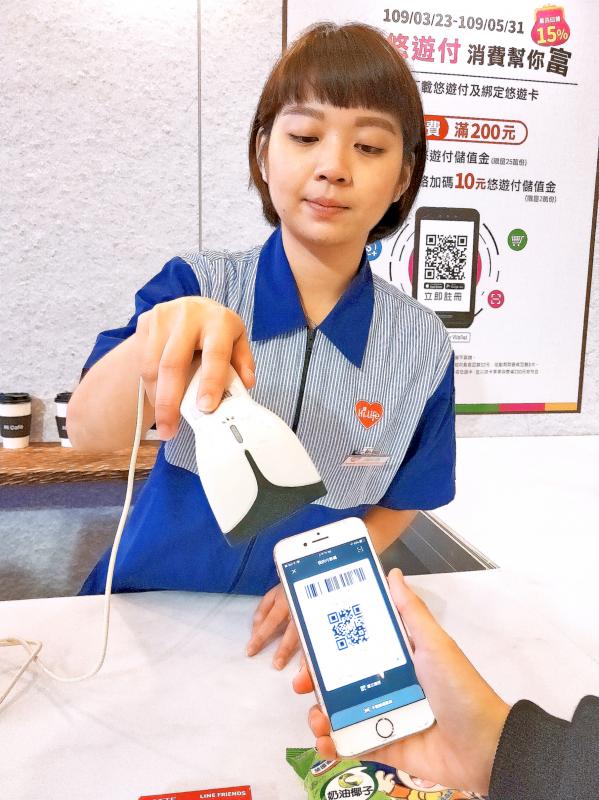Mobile payments jumped 127 percent from a year earlier to NT$120.9 billion (US$4.15 billion) in the first seven months of the year, as consumers embraced contactless payment amid the COVID-19 pandemic, data compiled by the Financial Supervisory Commission showed yesterday.
The use of mobile payment services, which enables consumers to pay their bills just by tapping their smartphones, has surged as people feel safer not having to hold cash or come into contact with devices that have been touched by other people.
As more consumers turn to mobile payment services, supermarket chain operator Pxmart Co Ltd (全聯實業) and state-run oil refiner CPC Corp, Taiwan (台灣中油), as well as several franchise shops and department stores have launched electronic wallets to boost consumer loyalty, the commission said.

Photo: Lee Ching-hui, Taipei Times
That some consumers chose to redeem their Triple Stimulus Vouchers via mobile payment services could also boost online transactions, the commission said.
Transactions made via electronic payment services — such as Jkos Pay operated by Jkopay Co (街口支付), and Line Pay Money offered by LINE Biz+ Taiwan Ltd (連加網路) and iPass Corp (一卡通票證) — totaled NT$45.6 billion in the first seven months, ranking first among the five types of mobile payment tools, the data showed.
E-payment transactions rose 3.18 times from NT$14.3 billion a year earlier, the fastest growth among the five tools, as more stores partnered with Jkopay or Line Pay Money, and more teenagers used the service to transfer money from bank accounts to e-payment accounts, the commission said.
It was the first time that transactions through e-payment services outperformed those via mobile credit cards, the data showed.
Mobile credit cards reported the second-largest transactions, with NT$36.6 billion in the first seven months, followed by mobile debit cards with NT$35 billion, mobile point-of-sale (mPOS) with NT$2.7 billion and electronic stored-value cards with NT$1 billion, the data showed.
Transactions via mobile debit cards reported the second-fastest growth of 2.59 times from NT$13.5 billion a year earlier, the commission said, attributing it to more banks promoting digital savings accounts by encouraging consumers to apply for debit cards and rewarding them with higher interest rates.
Although mobile payments still make up a comparatively small part of non-cash payments, which surpassed NT$3 trillion last year, they are expected to continue growing this year, the commission said.
Taiwan started mobile payment services in 2016, with accumulated transactions reaching NT$299.1 billion as of the end of July, the data showed.

A wave of stop-loss selling and panic selling hit Taiwan's stock market at its opening today, with the weighted index plunging 2,086 points — a drop of more than 9.7 percent — marking the largest intraday point and percentage loss on record. The index bottomed out at 19,212.02, while futures were locked limit-down, with more than 1,000 stocks hitting their daily drop limit. Three heavyweight stocks — Taiwan Semiconductor Manufacturing Co (TSMC, 台積電), Hon Hai Precision Industry Co (Foxconn, 鴻海精密) and MediaTek (聯發科) — hit their limit-down prices as soon as the market opened, falling to NT$848 (US$25.54), NT$138.5 and NT$1,295 respectively. TSMC's

SELL-OFF: Investors expect tariff-driven volatility as the local boarse reopens today, while analysts say government support and solid fundamentals would steady sentiment Local investors are bracing for a sharp market downturn today as the nation’s financial markets resume trading following a two-day closure for national holidays before the weekend, with sentiment rattled by US President Donald Trump’s sweeping tariff announcement. Trump’s unveiling of new “reciprocal tariffs” on Wednesday triggered a sell-off in global markets, with the FTSE Taiwan Index Futures — a benchmark for Taiwanese equities traded in Singapore — tumbling 9.2 percent over the past two sessions. Meanwhile, the American depositary receipts (ADRs) of Taiwan Semiconductor Manufacturing Co (TSMC, 台積電), the most heavily weighted stock on the TAIEX, plunged 13.8 percent in

In a small town in Paraguay, a showdown is brewing between traditional producers of yerba mate, a bitter herbal tea popular across South America, and miners of a shinier treasure: gold. A rush for the precious metal is pitting mate growers and indigenous groups against the expanding operations of small-scale miners who, until recently, were their neighbors, not nemeses. “They [the miners] have destroyed everything... The canals, springs, swamps,” said Vidal Britez, president of the Yerba Mate Producers’ Association of the town of Paso Yobai, about 210km east of capital Asuncion. “You can see the pollution from the dead fish.

ASML Holding NV, the sole producer of the most advanced machines used in semiconductor manufacturing, said geopolitical tensions are harming innovation a day after US President Donald Trump levied massive tariffs that promise to disrupt trade flows across the entire world. “Our industry has been built basically on the ability of people to work together, to innovate together,” ASML chief executive officer Christophe Fouquet said in a recorded message at a Thursday industry event in the Netherlands. Export controls and increasing geopolitical tensions challenge that collaboration, he said, without specifically addressing the new US tariffs. Tech executives in the EU, which is